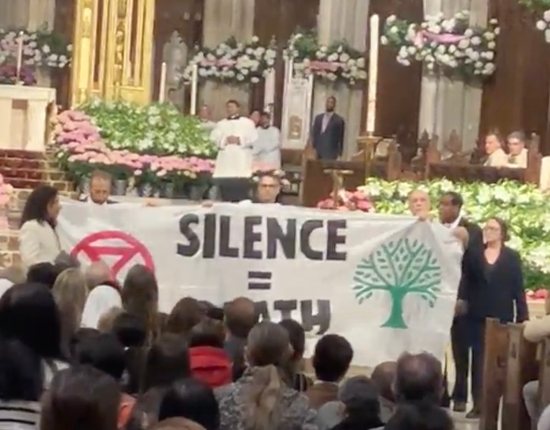
The Easter Vigil is a solemn celebration of Christ’s glorious redemption of humanity. But at St. Patrick’s Cathedral in New York City this year, it was also the scene of something else: a disruption in the name of a social cause.
During the March 30 liturgy, pro-Palestinian protesters walked to the foot of the sanctuary and unfurled a banner that read “silence=death.” The demonstrators stood there, upstaging the altar, before cathedral security intervened. Some of the activists yelled “free Palestine!” as they were escorted away.
To be sure, the situation in the Middle East demands action.
In just over half a year, the Israel-Hamas conflict — including Hamas’ Oct. 7 instigating attack — has now killed more than 1,200 people in Israel, including at least 30 U.S. citizens, Israeli officials have said. And the Palestinian death toll from the war has passed 33,200 — about two-thirds of them women and children, according to Gaza’s Health Ministry. Pressure needs to be exerted on the parties involved to bring the horrific violence to a swift end and to take steps toward lasting peace.
But ironically, the protesters profoundly undermined the humanitarian goals they were working for through their actions, and not just because, as several accounts have pointed out, their disruptiveness and disrespectfulness likely alienated people from their cause.
The issue is far more fundamental: By turning the Easter liturgy into a stage on which to advocate for a temporal good, the activists unwittingly undercut the very existential foundations that give their humanitarian cause its ultimate coherence and legitimacy.
Here’s why: The liturgy is fundamentally an act of communion between God and man. In fact, it is God’s invitation to man, through Jesus Christ, to participate in the divine life. In other words, it is the most profound affirmation of the dignity of humanity imaginable. That we can enter into true worship of God secures the fact that man is not alone, underscoring that his ultimate worth and value is not something contestable or up for grabs, but is given and guaranteed by the divine.
This is all the more clear at the Easter Vigil, when we celebrate the culmination of Christ’s redemptive mission, which affirmed the goodness and value of humanity every step of the way, from the incarnation to the resurrection. At Mass, we participate in this very act of redemption, the paschal mystery, reaffirming the fact that we are made in the image and likeness of God, have been redeemed by his Son, and are being drawn to him through his Holy Spirit, truths that are the bedrock of our claims about the dignity and value of human life.
Even for non-Christians, the acknowledgment that we are created by God, a truth available to unaided reason, is at the heart of most accounts of human dignity, and worship is both an expression and affirmation of that God-given value.
But by symbolically saying that their cause was more important than worshipping God, the pro-Palestinian protesters at St. Patrick’s Cathedral effectively denied the basis for human dignity that justifies their entire campaign.
Put another way, if the vision of reality advanced by the protesters’ actions — a reality in which temporal goods are ultimate, and divine communion is not — is true, then man is by himself. He is existentially cut off from God, and therefore from the source of any real sense of human dignity. There is no ultimate justice and, frankly, there is really no reason to care about Palestinian civilians being massacred, other than sentiment and/or factors motivated by power.
Point being: To deny God and our relationship with him is to deny humanity. Every time.
This is the danger of the activistic spirit, which views its cause as so important that it even trumps the primacy of receiving from God. This can happen with any cause, no matter how good, from the pro-life movement to efforts to treat migrants with compassion.
This isn’t to say Christians should avoid political and social activism. In fact, our faith demands engagement in the public square for the sake of the common good.
But activists should remember that communion with God is not a competitor to causes promoting human dignity — it’s what guarantees their legitimacy. Rather than something to upstage or ignore, those working for justice and the common good should see prayer and worship as foundational, not merely as a means to achieving their social and political ends, but as the most essential expression of man’s dignity and worth.
Or, at the very least, they shouldn’t interrupt Easter Vigil Mass.
Liedl, a Twin Cities resident, is a senior editor of the National Catholic Register and a graduate student in theology at The St. Paul Seminary School of Divinity in St. Paul.



